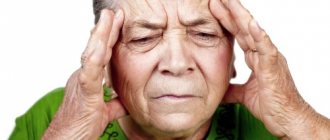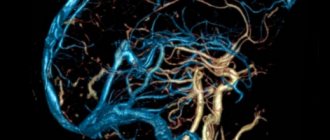Dementia is a decrease in a person’s mental abilities (dementia), which develops due to a chronic brain disease (death of nerve cells, impaired blood circulation in the brain). The diagnosis and treatment of dementia is carried out by a psychiatrist together with a neurologist.
Important
Despite the fact that dementia develops in old age, it is not a necessary component of aging. This is always a manifestation of a disease that needs to be treated.
Diagnosing dementia is a complex process. Several factors lead to the death of nerve cells (metabolic disorders, vascular pathology, cancer). And in order to prescribe adequate treatment, a psychiatrist and neurologist must identify them all. Read more about dementia treatment.
The following methods are used:
- Collection of complaints, medical history and examination by a psychiatrist.
- A thorough neurological examination performed by a neurologist.
- Psychological testing to assess intelligence, memory, thinking, conducted by a clinical psychologist.
- General clinical, biochemical blood tests.
- EEG, CT, MRI, Neurotest.
Dementia syndrome includes disorders of mental activity - memory, intelligence, abstract thinking - and the emotional sphere. A characteristic change in behavior in dementia is when a person becomes petty, whiny, and irritable. He often forgets where he put food, valuables or money, and then blames his relatives for the theft. A polite person becomes rude, a neat and punctual person becomes absent-minded and sloppy.
What are the early symptoms of dementia
Difficulty finding the right word
“It’s on the tip of my tongue, but I can’t remember!” - Almost everyone has been in such situations, even a young and completely healthy person. But it’s one thing if these cases are one-time or infrequent, and quite another if they begin to repeat themselves day after day. Deterioration in the ability to find words is one of the earliest and most striking signs of advancing dementia.
Increased forgetfulness
It's normal to forget where your keys or phone are from time to time. But if a person begins to regularly lose things, cannot remember what he ate for breakfast or what he talked about yesterday with a colleague, this indicates developing cognitive impairment.
Anxiety, suspiciousness
Naive optimism is a characteristic of youth. With age, we all become a little cynics, pessimists and stop believing in pink ponies. This is fine. It’s bad if just yesterday a cheerful person suddenly begins to distrust people and the world, to look for a catch in everything. “Is it a good discount? Surely the goods are expired!”, “Did your neighbor treat you to a pie? He probably wants to poison me!”, “They offered to take on a new project? Only because all normal people abandoned him!”
Such anxiety and suspiciousness, especially if they manifest themselves quite sharply in the character, are also not a good symptom.
Constant mood swings, depression
Damage to brain cells can affect the production of important hormones, including those that regulate mood. Many people with dementia experienced depression at the earliest stages of the disease.
Personality changes
It doesn't matter which way they happen. Perhaps yesterday's cheerful extrovert suddenly became grouchy. Or, conversely, a recently shy person suddenly turns into an overly sociable person. Any changes in character, temperament, or communication skills are a warning sign.
Disorders of orientation in time and space
Do you regularly have trouble remembering what day or day of the week it is? Or suddenly you discovered that you forgot the short way to the bus stop, you can’t figure out where the door to the right office is, even though you’ve been there more than once? Somewhere your brain is malfunctioning. It's worth finding out where. And isn't it dangerous?
Loss of interest in hobbies
Apathy, decreased interest in activities that you have been interested in for many years (be it sports, collecting, beadwork), attempts to avoid communication - even with close friends - are another symptom of creeping dementia.
Aimlessness
A man takes a bag and goes to the store, but returns without buying anything. Sometimes he wanders around the house or office back and forth without any apparent purpose. He asks the same questions over and over again, even though he has already received an answer to them. Such behavioral difficulties indicate a loss of ability to plan and concentrate. Which is also a bad sign.
Loss of ability to follow conversational logic or verbosity
Disturbances in brain function prevent a person from focusing on the topic of conversation. He constantly gets confused by extraneous things. For example, in a conversation about the benefits of apples, one may suddenly be struck by memories that are practically unrelated to the main plot: “Oh, what delicious apples I ate in the village with my great-grandmother! She had a huge garden. And her grandfather built her a house, everyone would like to have such husbands!”
Due to the lost ability to formulate thoughts clearly and concisely, a person has to indulge in lengthy reasoning. And in the process, he often forgets what he actually wanted to say.
Tendency to constantly rearrange, hide, accumulate objects
Hide the glasses so they don’t get lost, and then spend half a day painfully searching for them around the house. Refusing to throw away used equipment or broken furniture - “what if it comes in handy.” As dementia progresses, such incidents become more pronounced and regular.
Diagnostics
The disease is diagnosed after a comprehensive examination of the personality and brain. Which doctor makes the diagnosis - a neurologist.
Diagnostic criteria:
- Obligate (mandatory) symptoms. Memory disorder, plus impairment of one of the following functions: speech, praxis, optical-spatial orientation, thinking.
- Signs are present in the clinical picture for at least 6 months.
- Symptoms are characterized by increasing dynamics.
- In the clinical picture there are no syndromes associated with impaired consciousness (twilight stupor, stupor, stupor).
MRI for dementia depends on the cause. Thus, in images of a patient with Alzheimer's dementia, atrophy is observed in the temporal cortex and around the hippocampus. Brain imaging of patients with Lewy body dementia shows atrophy of the frontal gyri.
Differential diagnosis of dementia is carried out with the following diseases:
- With primary organic pathologies: Parkinson's disease, multisystem degeneration, progressive supranuclear palsy.
- A disease within the class of endogenous organic diseases itself: vascular dementia, Alzheimer's type dementia, dementia with Lewy bodies.
- Pick's disease.
- Hydrocephalic dementia.
- Brain tumors.
What to do if you notice early symptoms of dementia
The ideal option is to remember (preferably even write down) all the signs that worry you and contact a therapist or neurologist. The doctor will listen to you, ask you about your lifestyle, look at your personal history and may suggest you take some tests. For example, take urine and blood tests: sugar levels, thyroid hormones. You may need to do a cardiogram or MRI of the brain.
The fact is that the state of the brain is influenced by various factors: endocrine disorders, metabolic problems, anemia, vitamin deficiency, blood supply disorders, side effects from taking medications. Before talking about the prospects of dementia, a physician must rule out these conditions.
If your suspicions are confirmed, the specialist will tell you what to do. If necessary, he will prescribe medications that can support brain cells and protect them from damage.
In addition, you will need to adjust your lifestyle. By the way, these same Dementia activities are effective prevention of dementia.
Move more
Physical activity ensures good blood supply to the brain and helps it recover. Walk more, ride a bike and try to devote at least 150 minutes to exercise per week.
Communicate
Even through reluctance. Social activity is necessary for the brain like air. It helps him maintain youth and health longer.
Train your brain
Read, solve puzzles and crosswords, learn Chinese, follow the news, try to learn something new every day.
Quit smoking
There is evidence from Smoking Is Associated with an Increased Risk of Dementia: A Meta-Analysis of Prospective Cohort Studies with Investigation of Potential Effect Modifiers that nicotine may increase the risk of dementia and cerebrovascular disease. This is especially true for those who continue to smoke after the age of 45.
Get enough sleep
Provide yourself with at least 7-8 hours of quality sleep per day. Be sure to seek advice and help from a therapist if you have insomnia, snore, or suspect apnea.
Watch your diet
For brain health, a diet high in vegetables, fruits, fish, nuts, and olive oil is best. The Mediterranean diet is ideal.
Avoid vitamin deficiency
Some studies show Vitamin D and the Risk of Dementia: The Rotterdam Study that people with low levels of vitamin D in their blood are more likely to develop Alzheimer's disease and other forms of dementia. Also, experts from the American research organization Mayo Clinic recommend closely monitoring the level of consumption of vitamins B and C.
Why does the disease affect women more?
The issue is disputed in scientific circles, but despite this, statistics do not lie - the incidence of dementia among women over 60 years of age is significantly higher than that among men. There may be several reasons for this. Firstly, the cause of dementia may be hormonal levels - a sharp decrease in the level of sex hormones, mainly estrogen, that occurs during menopause. The likelihood of the first signs of dementia in this condition can be reduced with the help of properly selected hormone replacement therapy. Secondly, such a disease is a common cause of senile dementia. In turn, this pathology is also more common in women. There is an opinion among scientists that the onset of menopause, when combined with diabetes mellitus, leads to a more pronounced manifestation of signs of dementia in women.
Thus, the slightest irritation can take on unusual proportions and have serious consequences for the human condition. Almost half of patients suffer because of this. External circumstances often accentuate anxiety: alone at home, for example, or, conversely, located in the city. When these situations are known to the person and are likely to be repeated, anxiety may arise due to fear of another anxiety attack.
Practicing physical activities such as yoga, tai chi can help control his anxiety. France. Parkinson's volunteer committees may offer this type of activity. The proportion of people with depression is much higher in Parkinson's than average. This seems understandable because of the difficulties associated with symptoms, changes in relationship with the environment, and awareness of evolution.
Folk remedies
You can also use folk remedies for treatment. Their use should be very careful, since sometimes the components can cause allergies or provoke an exacerbation of chronic diseases. A preliminary consultation with a doctor is recommended.
How to treat manifestations of senile insanity using folk methods:
- Buy dried or frozen blueberries, cover them with water and put on fire for 15 minutes. Drink one glass of prepared compote every day.
- Pour half a liter of vodka into one spoon of elecampane root, close and let it brew for one month. Drink one spoon three times a day before meals.
- Grind dry sage castings, take one spoon and pour half a liter of boiling water, leave for half an hour. Take up to 4 times a day.
- Pour boiling water over some fresh mint leaves with grated ginger root and let it brew. Take cool daily. There are no volume restrictions.
- Mix one spoon each of valerian, mint and rose hips, pour a liter of boiling water over them, let it brew for about 20 minutes. Drink half a glass twice a day.
It is not recommended to add sugar to compote or tea. It is advisable to replace it with a small amount of natural honey. It has a positive effect on the general condition of the body, but can be harmful if abused.
Traditional methods also include therapy using oils. Mint, lemon balm, orange, lavender, clove or cocoa will do. They can be added to the bath and lie in it for at least half an hour, used for body massage, or simply rubbed into the skin.
ICD-10 code
Medical science classifies the disease as an organic dysfunction that occurs with psychological disorders of thinking, memory, and behavior; it gives it another name - dementia.
This violation has its own typology and codes (F00-F09). 1. Senile dementia caused by Alzheimer's disease (F00) is considered a poorly understood phenomenon, its causes are practically unknown. This type of dementia has a slow but steadily progressive course. 2. Vascular dementia, the symptoms and treatment of which depend on the underlying disease, is coded F01.
This is a secondary pathology, it is the result of brain damage as a result of strokes, atherosclerosis or trauma (bruises, wounds, contusions). With timely initiation of therapy for this form of dementia, the cognitive sphere is partially restored. And although patients cannot carry out complex mental operations (counting money, analyzing what they read, etc.
), they successfully take care of themselves (visit the toilet, shower and eat, etc.). 3. Dementia caused by other diseases (F02) is associated with tumor processes, neuronal damage due to infections, inflammatory and degenerative diseases. 4. Cases of dementia of unspecified genesis (origin) according to code F03 occur against the background of psychosis and depression.
ICD-10 gives a definition of each type of dementia known to science and a brief explanation of it.
Alcoholic, idiopathic or inorganic forms of dementia received their own individual code and description in it.
Medical science classifies the disease as an organic dysfunction that occurs with psychological disorders of thinking, memory, and behavior; it gives it another name - dementia.
This violation has its own typology and codes (F00-F09). 1. Senile dementia caused by Alzheimer's disease (F00) is considered a poorly understood phenomenon, its causes are practically unknown. This type of dementia has a slow but steadily progressive course. 2. Vascular dementia, the symptoms and treatment of which depend on the underlying disease, is coded F01.
This is a secondary pathology, it is the result of brain damage as a result of strokes, atherosclerosis or trauma (bruises, wounds, contusions). With timely initiation of therapy for this form of dementia, the cognitive sphere is partially restored. And although patients cannot carry out complex mental operations (counting money, analyzing what they read, etc.
), they successfully take care of themselves (visit the toilet, shower and eat, etc.). 3. Dementia caused by other diseases (F02) is associated with tumor processes, neuronal damage due to infections, inflammatory and degenerative diseases. 4. Cases of dementia of unspecified genesis (origin) according to code F03 occur against the background of psychosis and depression.
Alcoholic, idiopathic or inorganic forms of dementia received their own individual code and description in it.












